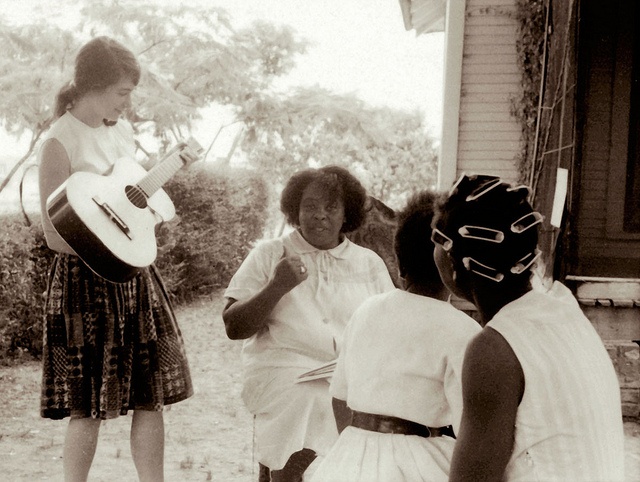'It was the most important thing I ever did'

In a stuffy gym at Tougaloo College in northern Jackson, Mississippi, they lined up behind two microphones, hundreds of people waiting to tell a small piece of their life story.
They had gathered at a conference to commemorate the 50th anniversary of Freedom Summer, the 1964 civil rights project that brought nearly 1,000 volunteers to the Magnolia State to register voters and draw national attention to the Southern freedom struggle.
During a "Freedom Roll Call" at the conference, hundreds of civil rights veterans lined up to say -- in two minutes or less -- what they had done in the movement and what it had meant for their lives. Most weren't household names or leading figures in civil rights histories. Some were native Mississippians, but most had come South in 1964 from Chicago, New York and elsewhere across the country with little idea that they would make history.
But in Mississippi towns like Greenville, Hattiesburg, Laurel and McComb, they worked with local leaders to chip away at barriers to voting rights, stand up to intimidation, dispel fear, and build vehicles like Freedom Schools and the Mississippi Freedom Democratic Party to counter the state's segregated educational and political institutions.
A common theme among the veterans who briefly shared their life trajectory after Freedom Summer was how it profoundly shaped the rest of their lives. "It was the most important thing I ever did," said a volunteer who had come from Minnesota. Some volunteers stayed or came back to Mississippi and immersed themselves in the movement. Others went home and pursued careers in law, teaching or organizing back home.
For thousands of local activists and national volunteers, Freedom Summer and the civil rights struggle were a massive leadership training program -- a life-changing project that not only shaped their moral and political outlook but developed their skills in improving their communities in the South and beyond.
"It was a leadership incubator," said Marian Wright Edelman, who first came to Mississippi in 1961 and recalled being picked up at the airport by Medgar Evers, who was assassinated in 1963 in Jackson, Miss. Edelman went on to found the Children's Defense Fund, one of dozens of advocacy and social change projects launched by civil rights veterans.
This was especially true for the women who formed the backbone of the civil rights struggle. As Dorie Ladner, a Mississippi native and Freedom Summer veteran noted, "It was left largely to the women to find housing for the summer volunteers with other black families. This was the first time any of these families had had a white person live in their homes."
A BROADER LEGACY
As many of veterans at the conference readily admit, Freedom Summer largely fell short in its effort to register and mobilize black voters. In Mississippi communities, the cloud of violence and intimidation hung over grassroots voter registration efforts, most notably the June 1964 killings of James Chaney, Andrew Goodman and Michael Schwerner.
But the mobilization and the national attention it generated helped lay the groundwork for the passage of the Voting Rights Act of 1965. The activists trained in the civil rights movement went on to become leaders in movements against the Vietnam War and for the rights of women, lesbian and gay people, Asian-Americans, Chicanos and Native Americans.
"Freedom Summer and the civil rights movement affects the breath of every person in this room," historian Taylor Branch told the conference. "It opened the gate for all other movements, opened up freedom for lots of people."
Conference participants have few illusions about the legacy of the movement. Despite shaking the foundations of segregated Southern society, breaking down racial barriers and electing hundreds of black elected officials, the challenges remain daunting. Mississippi schools, for example, suffer from chronic underfunding and severe racial disparities.
A large share of attendees at the Freedom Summer 50th anniversary conference were 30 or under, part of a commitment by organizers to carry forward the movement's legacy of training new leaders, including a new generation working on immigration, schools, workers' rights and other issues. On Friday, the conference organized a demonstration to support autoworkers at a Nissan plant in nearby Canton who have been working for years to unionize the 5,000-strong workforce in what is considered a key battle for labor in the South.
How much has Mississippi and the South changed since Freedom Summer? Organizer Bob Moses, a New York native who launched the Student Nonviolent Coordinating Committee's Mississippi project in 1961, said that subtle but powerful symbols of change can be found everywhere in the landscape.
For example, when Chaney, Goodman and Schwerner were killed in 1964, civil rights activists found little help from police officials, including the Federal Bureau of Investigation. Since then, the FBI office in Jackson, Mississippi has been renamed: It's now the James Chaney, Andrew Goodman, Michael Schwerner and Roy K. Moore Federal Building.
"It was a symbol of Mississippi becoming part of the country," said Moses. And while it was symbolic, he added, "What you have to appreciate is just how much it took to just get that much."
Tags
Chris Kromm
Chris Kromm is executive director of the Institute for Southern Studies and publisher of the Institute's online magazine, Facing South.
